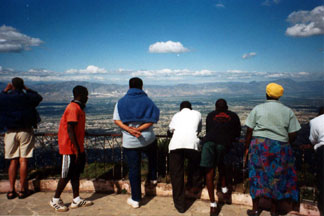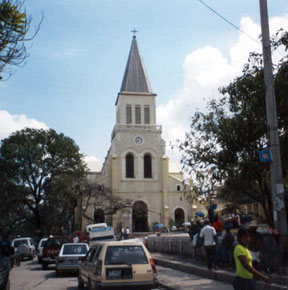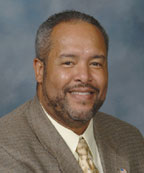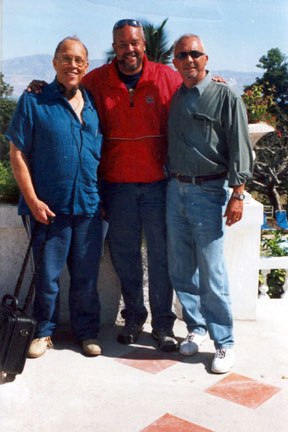 |
Dr. Pamies, left, and others observe some of the violence taking place in Haiti. They are observing from the home of Dr. Pamies’ sister, Linda, and her husband, Ben Boucard. The Boucard home is located in a mountainous area in a suburb of Port-au-Prince. |
The merry-go-round started spinning for Dr. Pamies on Feb. 19, when he received word that his 75-year-old mother, Liliane, had died unexpectedly in her native homeland of Haiti.
As Dr. Pamies put it, “My mother did everything for our family. She was a tough lady. She worked two jobs. She was the person that moved our family from Haiti to New York in the 1960s. Whatever measure of success I’ve had in my life, I owe it to my mother.”
Returning to Haiti
Like any good son, Dr. Pamies knew he had to return to Haiti and pay his final respects to his mother. Unfortunately, the timing was terrible. Rebels were working to overthrow the Haitian government, and the country was in complete turmoil. Dr. Pamies would fly to Haiti – but due to the danger – he would fly alone and leave his wife, Taka, and 1-year-old son, Michael, in Omaha.
 |
This is the church in Port-au-Prince, Haiti, where Liliane Pamies’ funeral service took place. |
Those words turned out to be prophetic. Dr. Pamies was met at the airport in Port-au-Prince, Haiti, by his brother-in-law, Ben Boucard, a Haitian businessman who is married to Pamies’ sister, Linda.
“As soon as I saw Ben, I could tell things weren’t right,” Dr. Pamies said. “He seemed very anxious. He told me ‘to keep my eyes open.’ This is the carnival season in Haiti, and normally there is lots going on this time of year. Instead, there weren’t many people on the streets, and many of the businesses were closed. It was eerie.”
Making funeral arrangements
The Haitian Civil War continued to escalate from the moment Dr. Pamies arrived. Communications were very poor. Phone lines were down. The smart thing to do was stay home and not go out.
Liliane Pamies’ body had been taken to a funeral home, but funeral arrangements still needed to be made. Dr. Pamies and Boucard tried to meet with the funeral director at a church in Haiti to bring a dress for Liliane to be buried in. Due to shooting going on near the church, the meeting had to be cancelled.
They tried a second time and were successful in getting the dress to the funeral director. But, it wasn’t easy. “We gave him the dress and jetted out of there,” Dr. Pamies said. “Having the funeral was out of the question. Everything was erupting around us. There were people dying right in front of us. Ben was driving so fast. It was like you see in the movies. It was horrible.”
On guard
The Boucards live in a suburb of Port-au-Prince in a mountainous area. There is just one road leading up to their home. At night, gunfire could be heard throughout Port-au-Prince. “You had to be ready for anything,” Dr. Pamies said. “Ben and I would take turns standing watch using binoculars, and we would leave a .38 (caliber pistol) next to our beds.”
 |
Rubens Pamies, M.D. |
Because Boucard had a cell phone, Dr. Pamies was able to keep in touch with his family in Omaha and some of his colleagues at UNMC. It soon became obvious that he was not going to be flying out of Haiti on Feb. 27, and he was beginning to wonder if his family would even get to pay its last respects to Liliane.
Sen. Nelson assists in flight arrangements
Fearing for Dr. Pamies’ safety and his uncertain return to Omaha, the UNMC colleagues made contact with the staff of Sen. Nelson to make them aware of Dr. Pamies’ plight and determine what could be done to assist him. W. Don Nelson, state director for Sen. Nelson, placed several phone calls to the U.S. Department of State to see what could be done to get Dr. Pamies out of Haiti.
After several days of negotiations, the State Department cleared Dr. Pamies to be on board the first U.S. plane to bring Americans from Haiti. The charter flight on March 2 included Dr. Pamies and about 200 other Americans.
“There are about 20,000 Americans in Haiti,” Dr. Pamies said. “I can guarantee you that about 19,900 of them would have loved to have been on that flight. Words can’t adequately express how grateful I am to Sen. Nelson’s staff for doing what they did to get me on that first plane leaving Haiti. They really went the extra mile for me.”
The demise of Aristide
While Dr. Pamies anxiously awaited his return to the U.S., the Haitian Civil War took a dramatic turn last weekend, as U.S. and French military troops entered Haiti to help quell the unrest. Soon thereafter, Haitian President Jean-Bertrand Aristide relinquished his position and left the country, and new leadership was put in place.
The demise of Aristide resulted in widespread looting throughout Haiti. “Haiti’s a very poor country,” Dr. Pamies said. “When Aristide left, it gave looters their chance to take advantage of the situation. There was looting going on everywhere. It was really crazy.”
 |
Dr. Pamies, center, gets ready to leave Haiti on March 2 on the first flight taking Americans out of Haiti. With him are his brother-in-law, Ben Boucard, right, and a Haitian-American who writes French novels and who also was flying back to the U.S. |
Finally, on March 1 – the day before Dr. Pamies was going to leave Haiti – the family was able to hold a funeral service for Liliane Pamies. “I’d been in Haiti for nine days, and it was the first time I had seen my mother,” Dr. Pamies said. “It helped us all put some closure on her death.” Ironically, they were unable to get a permit to have her buried, as the war had produced a huge backlog of people awaiting burial.
The Americans leaving Haiti were put on several buses and driven to the Port-au-Prince airport with a Marine escort featuring three well-armed Humvees.
“It was unbelievable,” Dr. Pamies said. “As we drove through the streets to the airport, people would just stop and stare at the buses as they went past. You can only imagine what they must have been thinking, but I think most would have loved to be on that bus and getting out of this misery.
“When we arrived at the airport, it was like a fortress. There were troops all over the place and trucks with guns mounted on them. Once the plane took off, it was the first time I felt safe.”
Landing in Florida, Omaha
The flight landed in Fort Lauderdale, Fla., around 6:30 p.m. on Tuesday. A Red Cross team provided bus transportation, and all the passengers had to be processed through customs and immigrations. Dr. Pamies stayed in a hotel overnight, then flew out Wednesday morning arriving in Omaha at 11:30 a.m. His wife and son, and Margaret Robinson, his assistant at UNMC, met him at the airport.
Grateful to Sen. Nelson, UNMC colleagues
In addition to expressing his appreciation for the efforts of Sen. Nelson’s staff, Dr. Pamies was grateful for the behind the scenes work of several UNMC colleagues including: Harold M. Maurer, M.D., chancellor; Tom Rosenquist, Ph.D., vice chancellor for research; Bob Bartee, executive assistant to the chancellor; and Robinson.
He had special praise for Dr. Rosenquist, who kept in almost daily phone contact with Dr. Pamies throughout the ordeal. “If not for Tom, I don’t know what I would have done,” Dr. Pamies said. “He was incredible. He kept telling me to just hang in there…that everyone was working to get me back to the U.S. He was my support mechanism. He acted like I was one of his own family. I give him all the credit in the world.”
‘New chapter for Haiti’
In looking back, Dr. Pamies said the entire experience seemed to have been orchestrated by his mother. “My mother left Haiti originally because of a dictatorship. She took her family to New York, then came back to Haiti a couple years ago when her health was failing to live with my sister – only to find another oppressive situation going on,” he said. “I found it ironic that we were unable to have her funeral service until Aristide was out of power. It’s almost like this gave her closure. She may not have been with us in body, but she was in spirit. Maybe this will be a new chapter for Haiti.”